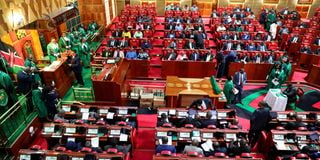Cash crunch to hurt bottom-up plan execution, Ruto warned

Parliament in a past session. The Parliamentary Budget Office has warned that funding could hinder the implementation of the Kenya Kwanza manifesto.
What you need to know:
- The implementation of Kenya Kwanza’s manifesto will be difficult to achieve unless the government reworks its plan, the Parliamentary Budget Office (PBO) has said.
- In a report on its assessment of the cost implications of the bottom-up economic transformation plan posted on Parliament’s website, PBO estimates it will cost at least Sh2.67 trillion to fully implement the manifesto within the next five years.
- Out of this, Sh473 billion is required in the first financial year to implement the proposed interventions.
The implementation of Kenya Kwanza’s manifesto will be difficult to achieve unless the government reworks its plan, the Parliamentary Budget Office (PBO) has said.
In a report on its assessment of the cost implications of the bottom-up economic transformation plan posted on Parliament’s website, PBO estimates it will cost at least Sh2.67 trillion to fully implement the manifesto within the next five years. Out of this, Sh473 billion is required in the first financial year to implement the proposed interventions.
Although the financing plan proposes to halt commercial borrowing, reduce domestic borrowing and capitalise on concessional financing, PBO warns that reliance on concessional loans may not be feasible in the short term due to the volatility of such financing and the time required to negotiate the loans.
While addressing the inaugural joint sitting of the 13th Parliament last year, President William Ruto undertook to reduce the Sh860 billion deficit in the Sh3.36 trillion budget for the current financial year by Sh300 billion. However, PBO warns that reducing the budget while accommodating the cost of implementing the bottom-up manifesto in the first year will be a difficult task to accomplish.
“The fiscal consolidation plan is laudable. However, cutting expenditure in the existing fiscal framework while accommodating the cost of implementing the manifesto proposals may prove an arduous task. It has a notable impact on the deficit which is likely to expand by similar proportions,” says PBO.
A summary of the bottom-up expenditure plan shows that roads will gobble Sh823.3 billion within the five years followed by education Sh635.3 billion, micro, small and medium enterprises (MSMEs) Sh397.7 billion, health Sh259 billion, agriculture Sh250 billion and social protection Sh116 billion, among other expenditures.
According to PBO, the plan assumes that for every new project, resources will be released by an existing programme, which may not be the case.
Enactment of laws
PBO also notes that proposals on interventions such as the MSMEs fund will require the enactment of enabling laws and as such, their architecture may significantly be altered.
Further, the budget office says that interventions under agriculture and healthcare are devolved and that there is no implementation arrangement that has been proposed in the plan “to ensure efforts are not duplicated and the principle of complementarity prevails.”
Some of the proposals in the bottom-up plan, especially on healthcare that may require Sh259 billion over the next five years, have been alluded to as being budget neutral but PBO says that in reality, they require additional resources.
“This may have a negative implication on the envisioned fiscal framework,” the PBO document says.
Failure to indicate the cost of providing Universal Health Care is another issue that has been flagged by the experts.
“Such costing is usually complex and it involves deeper analysis of supply factors such as available health facilities, level of technology, protocols and demand factors such as demography, epidemiology among others.”
Data from the World Health Organization (WHO) indicates that a low-income country would need to spend USD60 per capita to ensure a health system capable of providing current and emerging healthcare needs.
Further, PBO says that Interventions within specific sectors are not prioritized as proposed in the manifesto.
This means that it is not possible to rank them in order of priority and “optimally” allocate them resources, meaning that an attempt to implement them may result in some not being adequately funded and others not being realized.
The government is planning to explore a Public-Private-Partnership (PPP) programme as a financing model for projects in energy, housing, health, water and sanitation.
While PBO says that such a financing model will fast-track their actualization, “a cautious approach” is required to be undertaken.
“Experiences from the previous arrangements have revealed some challenges in terms of timeliness, cost and institutional rigidities. A critical consideration of the PPP will be important to ensure relatively more favourable terms. Some PPP may also result in contingent liabilities if not properly designed and implemented,” says PBO.





